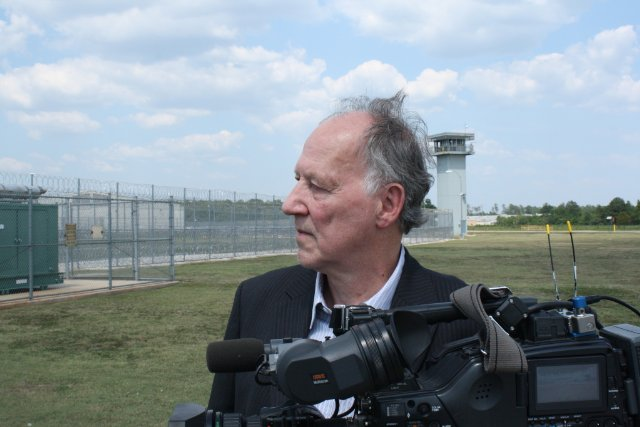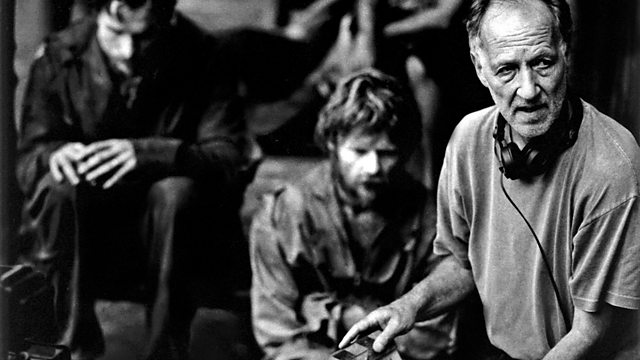El discrepante y productivo cineasta alemán Werner Herzog | The discrepant and productive German filmmaker Werner Herzog
A sus 81 años, cumplidos ayer (5 de septiembre), el cineasta alemán Werner Herzog nos sigue cautivando con su cine, hecho, desde su primer filme (Señales de vida, 1962) hasta su más reciente (El fuego interior: réquiem por Katia y Maurice Kfrafft, 2022), con una actitud y visión que cuestiona criterios establecidos y, a la vez, nos presenta a personalidades enfrentadas a la hostilidad del mundo.
============
At 81 years old, yesterday (September 5), the German filmmaker Werner Herzog continues to captivate us with his cinema, made, from his first film (Signs of Life, 1962) to his most recent (The Fire Within: Requiem for Katia and Maurice Kfrafft, 2022), with an attitude and vision that questions established criteria and, at the same time, presents us with personalities confronted with the hostility of the world.

Pertenece a esa generación del nuevo cine alemán que irrumpió en la década del 60 con una posición muy disconforme, en la que encontramos a otro grande como lo es Rainer Werner Fassbinder (a este dediqué dos posts en esta plaforma: 1 y 2). Ha dirigido aproximadamente 70 filmes, largometrajes y cortos, que incluyen ficción y documental, frontera que Herzog siempre trata de borrar en sus realizaciones.
Además de director, guionista, productor y actor de cine, ha llevado a cabo montajes de óperas, género musical dramático del cual es amante (algo de esa inclinación se percibe en varios de su filmes), pero también es escritor de memorias y de textos narrativos (de “no ficción”), como Del caminar sobre hielo, Conquista de lo inútil y su más reciente, El mundo crepuscular (2021, 2022), un libro entre la historia y la ficción sobre Hiroo Onoda, un oficial de inteligencia japonés que se mantuvo escondido durante 30 años sin creer que la guerra había terminado.
De su relación con el cine y la escritura ha dicho: “Es raro, pero puedo explicarlo fácilmente con una especie de máxima: mis películas son mi viaje y mi escritura es mi hogar”, “Creo que, hasta cierto punto, todos vivimos una determinada ficción que hemos aceptado y articulado y formulado para nosotros mismos”. No por casualidad entre sus autores favoritos están Virgilio, Hölderlin, Conrad y Hemingway.
============
He belongs to that generation of the new German cinema that burst in the 60's with a very nonconformist position, in which we find another great filmmaker such as Rainer Werner Fassbinder (to whom I dedicated two posts in this platform: 1 and 2). He has directed approximately 70 films, features and shorts, including fiction and documentary, a border that Herzog always tries to erase in his work.
In addition to being a director, screenwriter, producer and film actor, he has staged operas, a dramatic musical genre of which he is a lover (something of this inclination can be perceived in several of his films), but he is also a writer of memoirs and narrative texts (of "non-fiction"), such as From Walking on Ice, Conquest of the Useless and his most recent, The Twilight World (2021, 2022), a book between history and fiction about Hiroo Onoda, a Japanese intelligence officer who stayed in hiding for 30 years without believing that the war was over.
Of his relationship with film and writing he has said, "It's strange, but I can easily explain it with a kind of maxim: my films are my journey and my writing is my home", "I think that, to some extent, we all live a certain fiction that we have accepted and articulated and formulated for ourselves". Not by chance among his favorite authors are Virgil, Hölderlin, Conrad and Hemingway.

Volviendo a su cine, como he dicho, en sus realizaciones ha asumido la historia de diversos personajes que están caracterizados por rasgos generales comunes: seres al margen, anómalos, originales, rebeldes, solitarios, incluso desquiciados, que se enfrentan al mundo, afrontando su reto y la posibilidad de su fracaso. Suelen ser personajes extravagantes, extraídos de la realidad histórica o de la ficción. Sobre la relación con sus personajes ha afirmado: “Todos son familiares míos. Uno reconoce a sus hermanos”, “Creo que ninguno de mis personajes es extremo ni extraño. Son seres dignos y asumen la lucha de la vida tal como se les presenta”.
Hablemos, pues, sucintamente, de tres de sus filmes que concentran los personajes que más han llamado mi atención.
============
Returning to his cinema, as I have said, in his films he has taken on the story of various characters who are characterized by common general traits: beings on the margins, anomalous, original, rebellious, lonely, even deranged, who confront the world, facing its challenge and the possibility of failure. They are usually extravagant characters, extracted from historical reality or fiction. About the relationship with his characters he has stated: "They are all relatives of mine. One recognizes his brothers", "I believe that none of my characters is extreme or strange. They are dignified beings and take on the struggle of life as it presents itself to them".
Let's talk, then, succinctly, about three of his films that concentrate the characters that have most caught my attention.

Aguirre, la ira de Dios.
Un filme de 1972, en el que nos presenta parte de la aventura del conquistador español conocido como “Tirano Aguirre” en su enfrentamiento con la corona española y en su búsqueda de ese delirio que fue bautizado como “El Dorado”. Todo conduce a su final fatal, en medio del hambre, la muerte de sus acompañantes, la locura, enfrentado a las corrientes turbulentas del caudaloso río. La interpretación de este megalómano y perturbado personaje estuvo a cargo del sin par actor Klaus Kinski.
Aguirre, the wrath of God.
A 1972 film, in which he presents part of the adventure of the Spanish conquistador known as "Tirano Aguirre" in his confrontation with the Spanish crown and in his search for that delirium that was baptized as "El Dorado". Everything leads to his fatal end, in the midst of hunger, the death of his companions, madness, facing the turbulent currents of the mighty river. The interpretation of this megalomaniac and disturbed character was in charge of the peerless actor Klaus Kinski.
El enigma de Kaspar Hauser
Es mi filme favorito de los tres que refiero. Realizado en 1974, está basado en la historia real de un joven alemán que había estado encerrado en un sótano durante gran parte de su vida, sin contacto con el exterior y sin ninguna formación elemental. Un día, en 1828, apareció en las calles. Aprendió a hablar, a leer, a tocar el piano y a relacionarse con su entorno social, aunque este no lo asimilaba. Un día fue asesinado.
The Enigma of Kaspar Hauser
This is my favorite of the three films I refer to. Made in 1974, it is based on the true story of a young German man who had been locked in a cellar for most of his life, with no contact with the outside world and no elementary education. One day, in 1828, he appeared on the streets. He learned to speak, to read, to play the piano and to relate to his social environment, although it did not assimilate him. One day he was killed.
Nosferatu, el fantasma de la noche
De 1979, el filme es una visita renovada (homenaje) al filme Nosferatu, una sinfonía del horror (1922) del cineasta del expresionismo alemán, F. W. Murnau, la primera película sobre la figura antigua del vampiro. Herzog, jugando con el romanticismo decadente que está ya en la novela de Stoker y en el filme de Murnau, remarca el carácter solitario y trágico del personaje, condenado a la inmortalidad.
Nosferatu, the ghost of the night
From 1979, the film is a renewed visit (homage) to the film Nosferatu, a symphony of horror (1922) by the German expressionist filmmaker F. W. Murnau, the first film about the ancient figure of the vampire. Herzog, playing with the decadent romanticism already present in Stoker's novel and Murnau's film, emphasizes the solitary and tragic nature of the character, condemned to immortality.
============
Aunque quizás sobren mis palabras, subrayo el carácter dispar de los personajes de Herzog, rebelados contra el absurdo de la vida, o en una pretensión titánica que les lleva a la locura o a la anulación definitiva.
Si bien no ha sido reconocido aún en los Óscar, ha recibido premios César y en los afamados festivales de Cannes, Venecia, San Sebastián, entre otros europeos.
Si no conoce su obra los invito a hacerlo. Les dejaré al final unos enlaces a algunos de sus filmes.
Although perhaps my words are superfluous, I underline the disparate character of Herzog's characters, rebelling against the absurdity of life, or in a titanic pretension that leads them to madness or to definitive annulment.
Even he has not yet been recognized at the Oscars, he has received César awards and at the famous festivals of Cannes, Venice, San Sebastian, among other European festivals.
If you do not know his work I invite you to do so. I will leave at the end some links to some of his films.
Referencias | References:
https://es.wikipedia.org/wiki/Werner_Herzog
Alter, Alexandra (2022). “Werner Herzog: todos contra uno, uno contra todos”. Ver reportaje aquí.
https://www.clarin.com/revista-n/literatura/hombre-vision-nocturna_0_Syz-mYEdf.html
Filmes en Youtube:
Aguirre , la ira de Dios (1972)
El enigma de Kaspar Hauser (1974)
Nosferatu, el fantasma de la noche (1979) (en inglés con subtítulos en español)

Gracias por su lectura | Thank you for reading.





https://leofinance.io/threads/josemalavem/re-josemalavem-smbrj43r
The rewards earned on this comment will go directly to the people ( josemalavem ) sharing the post on LeoThreads,LikeTu,dBuzz.
Interesante que escribiste sobre Werner Herzog. Él está entre los directores que más me llaman la atención. He visto buena parte de las películas que ha realizado. Se ha distinguido por utilizar métodos pocos ortodoxos, en la producción sus filmes. Un ejemplo de esto fue la tala de la montaña que se efectuó en el rodaje de Fitzcarraldo.
Su última película con Kinski, "Cobra Verde" vale la pena verla.
Por otro lado "Fata Morgana" está lejos de ser una película "convencional". La considero muy interesante y su fotografía es excelente.
Cuando comencé mi blog en esta red. Escribí un par de publicaciones sobre mis impresiones de "Fitzcarraldo" y "Aguirre, La Ira de Dios" , dejo aquí los enlaces en caso que te interese.
https://peakd.com/spanish/@nenio/aguirre-la-ira-de-dios-comentarios-sobre-la-pelicula
https://peakd.com/spanish/@nenio/fitzcarraldo-mis-impresiones-sobre-la-pelicula
Saludos